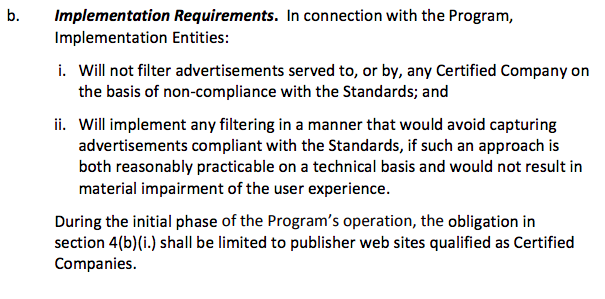
Just in time for the holiday season, Google slipped some coal into publishers’ stockings.
Google announced that on Feb. 15, its browser Chrome will begin blocking units that don’t meet the Better Ads Standards from the Coalition for Better Ads. Moreover, Chrome will remove all ads from sites that have a “failing” status in the Ad Experience Report, based on the Coalition’s guidelines, for more than 30 days.
However, there is a way around having all—or actually any—of your ads blocked: “volunteer” for the Coalition’s Better Ad Experience Program (BAEP), just introduced on Dec. 18. According to AdAge, volunteering would require a “donation” of $5,000 a year or less, depending on the publisher size.
“We anticipate fees will be reasonable and accommodate participation of entities ranging from small to large companies,” a spokesperson told AdAge.
BAEP appears to be another certification program along the lines of the Trustworthy Advisory Group (TAG). Non-compliance means publisher pageviews assessed fail to meet the Better Ads Standards: “specific ad formats and experiences that are largely unacceptable to consumers.”
Following the effective start date of the program (as yet to be determined), publishers will be considered non-compliant if 7.5% of pageviews analyzed in the first two months don’t measure up to the standard. This threshold drops to 5% in the following four months and 2.5% thereafter. It seems Chrome’s Ad Experience Report is following the same timetable starting Feb. 15.
Certified members of theBAEP will not have their ads blocked by the “Implementation Entities” (e.g., Chrome) due to violations. The process of informing certified publishers of non-compliance is not yet finalized, though BEAP members are advised to appoint a contact for notification.
Publishers will lose certification if they fail to contest the violations within 15 days or do not make corrections within a 30-day window. Guidance on independent dispute reconciliation is promised in January. For now, the framework can be found in this PDF.
While a lot of AdMonsters conferences this year have had a heavy focus on TAG certification, the threat of Chrome ad-blocking has been another black cloud hanging over publishers’ monetization strategies heading into 2018. Since Chrome is the most popular browser in the world, most publishers have merely grumbled and tried to align themselves with the Better Ad Standards.
However, it seems the BAEP enables publishers to completely avoid having any ads blocked in exchange for certification. There is a fee, but it’s much lower than TAG, which is currently only mandated by Procter & Gamble when it comes to advertising spend. Sites with a great deal of indirect monetization, particularly from open exchanges, may seek certification as monitoring format rules from many demand sources can be a challenge. The program is voluntary—publishers can monitor their Better Ads Standards compliance on their own.
As publishers are trying to comply with TAG and the looming GDPR and Privacy Shield regulations, BAEP seems like another burden, but it may prove a healthier alternative to Chrome’s ad-blocking. Certainly there will be grievances shared during a larger discussion at the Publisher Forum in Huntington Beach in March 2018.
Finally, an actual ad tech tax! https://t.co/fLlnnOHgOf
— Ari Paparo (@aripap) December 20, 2017
